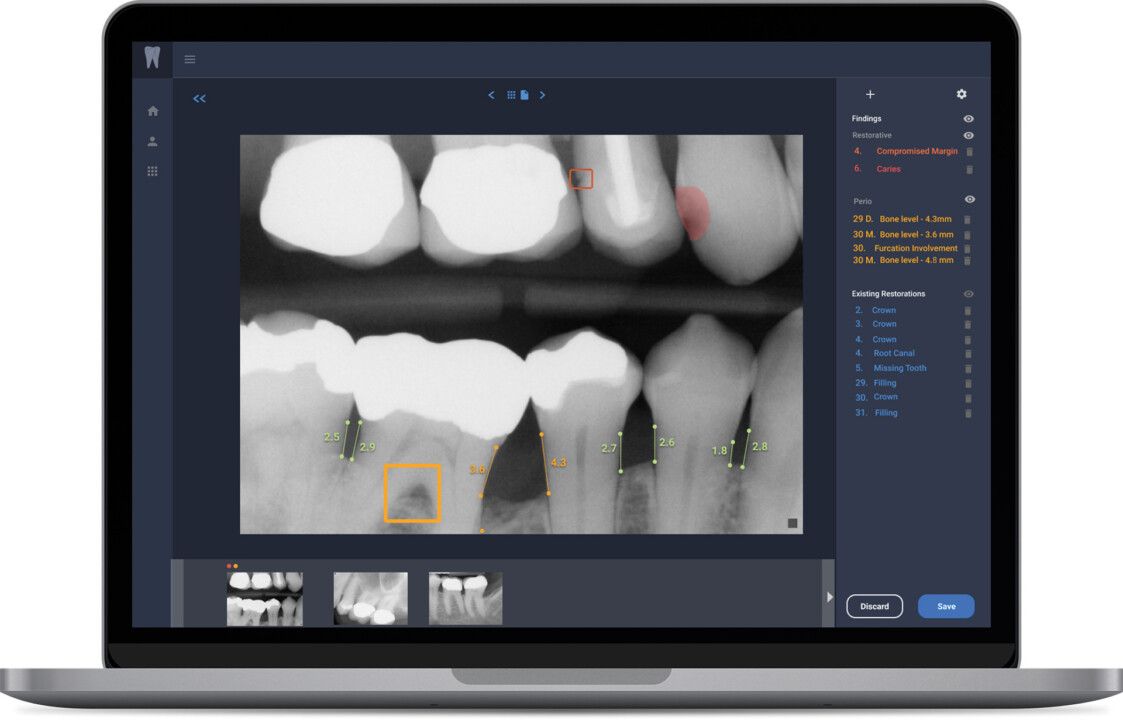Wondering what it’s really like to implement artificial intelligence into your practice’s clinical and business operations? One practice owner’s firsthand, day-to-day experience shows it’s ready for prime time—as long as you choose the right provider.
“TECHNOLOGY CAN BE WONDERFUL, but it can also be a way to mess something up faster.” That’s what Dr. Michael Verber remembers being told by none other than
Dr. Pete Dawson. Little wonder, then, that this serial early adopter was suitably cautious about implementing artificial intelligence into his growing 12-location practice, the
Verber Dental Group, in central Pennsylvania. But implement it he did, and he now calls AI a “wonderful asset” for today with considerable future potential—as well as a few small but significant caveats.
Decisions, Decisions
Dr. Verber started looking at AI, specifically Overjet, back in 2020, the product’s early days. He says that while he was excited about its clinical and claims capabilities from the beginning, “it took about nine months to see it develop to a point of comfort” and then another nine months of strategic planning to decide how best to implement it. He now thinks that was perhaps a bit overcautious. “In hindsight, we should have jumped in on this one sooner.”
Still, you can hardly fault his thoughtful approach, which is methodical while recognizing that the benefits of emerging technology can’t always be boiled down to a strict
numbers-based analysis when you’re investing in future potential as well. “The first thing we ask ourselves is whether the product will enhance an experience or an outcome for a patient or team member,” he says. “In the case of Overjet, for example, we saw a tool that would allow us to execute consistently high standards of care. It also provides incredibly powerful patient education because it visualizes the disease.”
However, the tipping point came when Dr. Verber saw an increasing number of third-party payers contract with Overjet for claims processing. That was “an indication,” he says, “that this particular technology was going to remain a viable industry leader and that it could help automate benefit determination and revenue cycle management.”
ROI, KPI and Today’s Reality
Dr. Verber says his team didn’t roadmap too many specific expectations for Overjet due to one big wild card. “We knew that we were going to have some challenges fully realizing ROI initially because of industrywide staffing shortages. Overjet does a fantastic job producing reports that illustrate a quantity of treatment that has been historically missed, especially periodontal treatment. It’s taken some time to hire to meet the demand, but we recognize that providing these periodontal services is a win-win. It means healthier patients and higher margins.”
He allows that “there are going to be problems anytime you implement a new technology,” and while that’s inescapable, doctors can and should expect that to be offset by a commensurate level of hand holding.
“In the case of Overjet, we really had a good experience with support.”
If you have good people, a good direction and a good plan, good AI can be a wonderful asset.”
—Dr. Michael Verber
Embracing Change—and Discovering Benefits
Careful not to force its adoption at the group’s practices, Dr. Verber instead took a more organic approach. “We did a gradual rollout over the course of the year,” he says. “The timing was really dictated by the human element. We wanted people to be excited about the technology. AI can sound a bit scary. We identified the offices that we thought would be early adaptors and started there. Once we started to get buy-in, we built momentum.”
Initially, hygienists were impressed by the caries detection aspect, and dentists liked the perio measurements. But Dr. Verber also says there was some initial trepidation, which he understands. “It’s a bit natural to initially resent something that holds you accountable. I think there was a bit of an ‘I don’t need this computer telling me my business’ thing going on.”
Yet Overjet is also helping relieve his team of health care’s greatest psychological burdens: telling patients that something is wrong. “Our practitioners started to really appreciate Overjet when they realized they did not have to be the bearers of bad news any longer. Overjet takes care of the confrontation by identifying a problem for you. Clinicians can focus on being the good guys and offering solutions.”
The Verber Dental Group is now using Overjet in every hygiene operatory. “Our standard operating procedure is that the technology will be used every time bitewing radiographs are taken. We also want our practitioners to look at reports daily to make sure we’re not missing treatment. Our next phase is to really look at the reports at a group level and incorporate the data into common-size analysis and KPIs.”
Drawing a Line Between Artificial and Human Intelligence
Overjet’s founder, Wardah Inam, says that “dentists shouldn’t care whether it’s AI or not; they should care about what’s in it for them” and that AI “will not take over our lives.” She likens it more to Siri rather than the dystopian future some envision. Similarly, Dr. Verber is quick to emphasize that in his view, AI is “a tool” and “a way to leverage our human intelligence, not replace it. And the result is only as good as the quality of the tool and the people using it.”
He recalls having disastrous results in the past with another AI technology, a software product that promised to automate insurance claim processing and revenue cycle management. “Our accounts receivable skyrocketed by over a million dollars, and we had to reassemble a team of quality people to clean up the mess. The experience was crippling for our company, and it has taken almost a year to fully recover.” He cautions others to learn from his experience. “Be careful. Not all AI is the same. Make sure a technology has not been rushed to market.”
“AI Is Not the Future. AI Is the Now.”
Despite protestations from certain camps that AI’s potential is years away from being fully realized, practice owners and executives like Dr. Verber and his team are proof of the contrary. It’s within reach right now, financially and operationally, for more practices than ever. And Dr. Verber’s group shows that users shouldn’t sacrifice the considerable current benefits of AI just because there’s more to come.
“It’s all around us, whether we’re aware of it or not,” he says. “Savvy operators are going to be using AI more and more in every silo, from the clinical to marketing to operations and inventory management. If you have good people, a good direction and a good plan, good AI can be a wonderful asset.”






